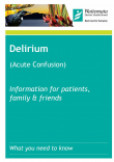There are many causes of delirium in palliative care and often there is more than one contributing factor.
Common causes include:
- unfamiliar environment in the hospital or hospice
- unrelieved and uncontrolled pain
- fatigue
- pressure sores due to immobility
- anxiety or depression
- organ failure such as liver or kidney failure
- brain metastases or leptomeningeal disease caused by cancer or its treatment
- high blood calcium or hypercalcemia
- dehydration
- biochemical abnormality such as low blood sugar, low blood sodium
- low oxygen in your blood (hypoxia)
- infection or sepsis
- medicines such as amitriptyline, opioids, steroids
- urinary retention (difficulty completely emptying your bladder)
- constipation
- withdrawal from drugs such as nicotine, opioids and alcohol
- prolonged seizures (status epilepticus).
Sometimes it has no causes, especially in the last weeks to hours of life.









